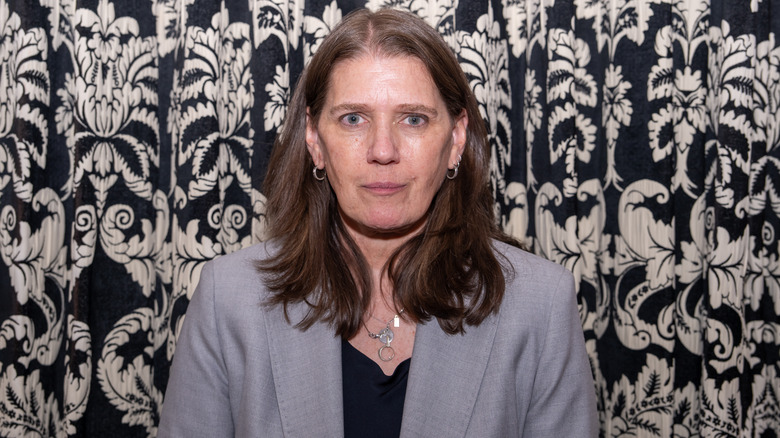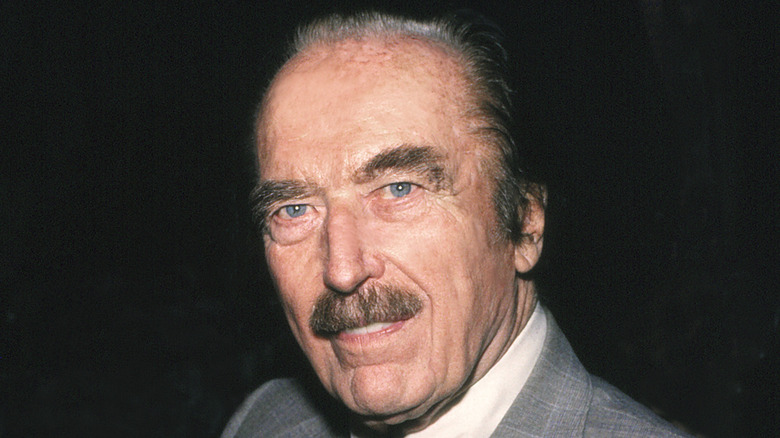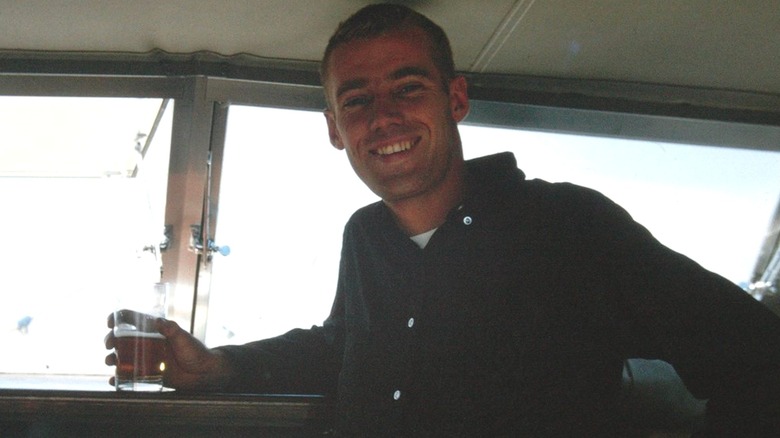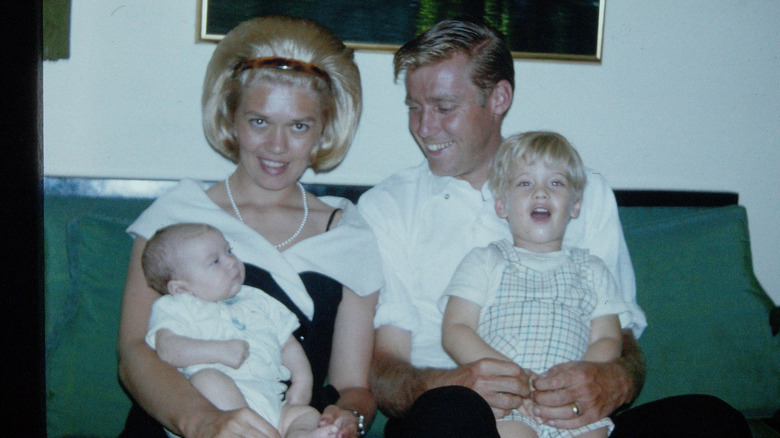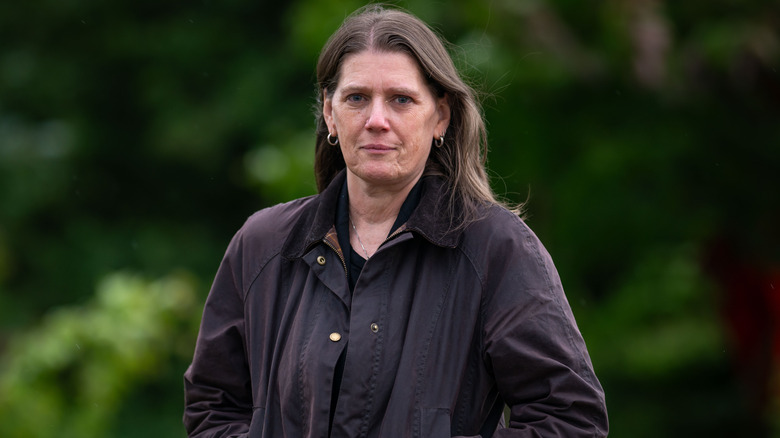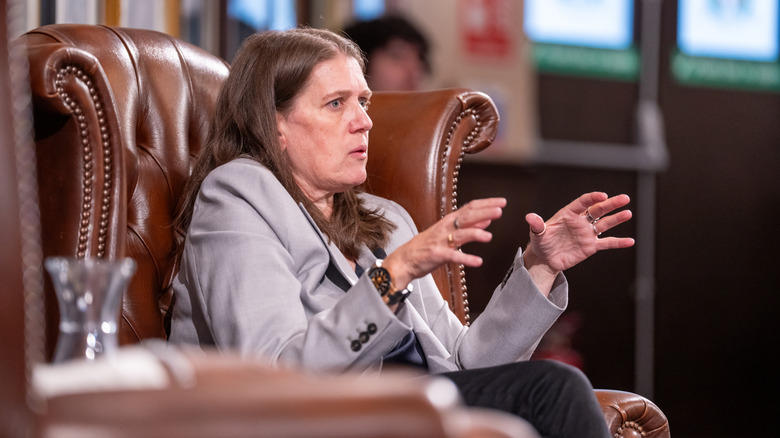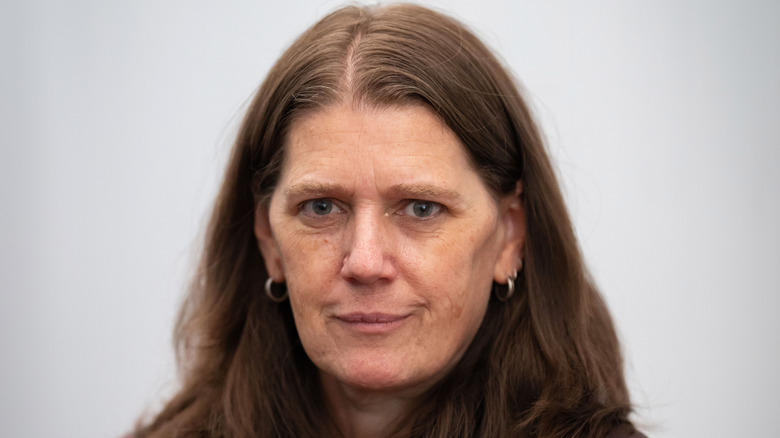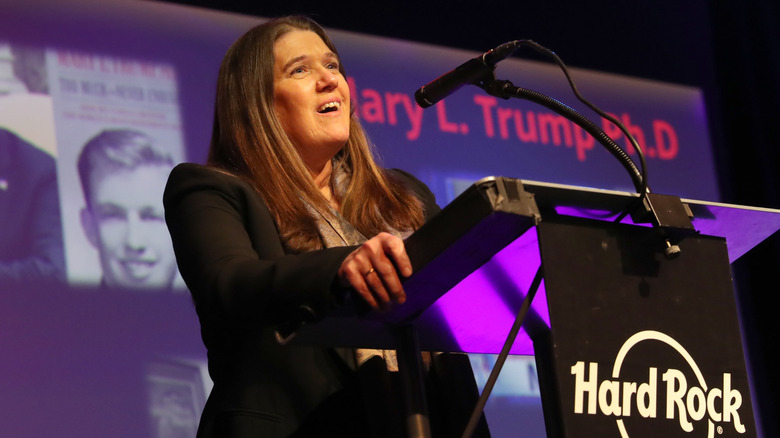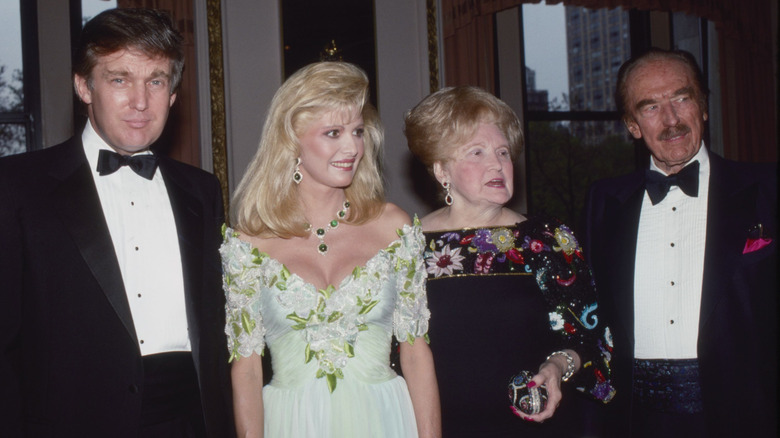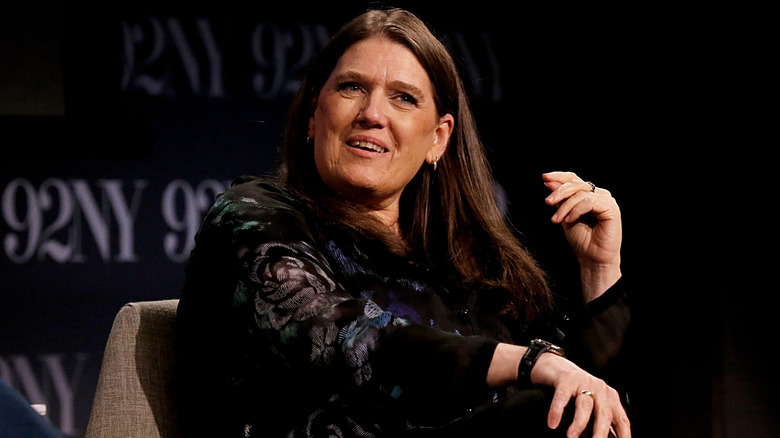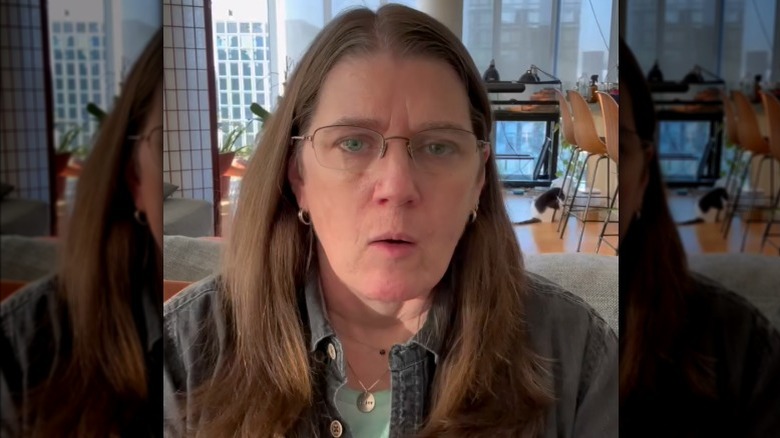The Tragic Story Of Donald Trump's Niece Mary
We may receive a commission on purchases made from links.
The following article contains mentions of addiction and mental health, and allegations of domestic abuse, child abuse, and sexual assault.
Almost every family member of President Donald Trump has profited off his name, even when they aren't casting the president in a positive light, as has been the case with his niece, Dr. Mary Lea Trump. While benefiting in many ways from the Trump brand, the family name has also served as an ancestral curse of sorts, contributing to many personal tragedies and traumas throughout her life. A successful clinical psychologist, educator, podcaster, and CEO of a life-coaching company, Mary has nonetheless become most famous in the era of Trumpian politics thanks to her filial affiliation with the president.
Her personal experience in the family — combined with her psychological analysis on a professional level — has informed Mary's multiple books on the president and the Trumps in general. However, Mary's books — while they certainly provide tantalizing tidbits of the Trumps' dirty history — also eloquently chronicle the rise and fall of the Trump family's reign of New York from the inside, diagnosing its many tragedies. They paint a painful self-portrait of a woman whose surname doomed her in many ways, of a little girl who silently suffered the slings and arrows of her cruel upbringing until realizing, by confronting her past with fearlessly vulnerable writing, that the only way out is through.
Mary Trump and her family survived a 'sociopathic' grandfather
Like most psychologists, Mary Trump has often traced the history of her and her family's emotional and psychological issues back to childhood. Particularly, the domineering figure of the Trump patriarch — her grandfather, real estate tycoon Fred Trump. According to Mary, Fred's narcissism and sadism formed a cesspool of neuroses that would define the Trump family. In her 2020 book, "Too Much and Never Enough: How My Family Created the World's Most Dangerous Man," she wrote, "None of the Trump siblings emerged unscathed from my grandfather's sociopathy and my grandmother's illnesses, both physical and psychological, but my uncle Donald and my father, Freddy, suffered more than the rest."
In her books, Mary detailed being born in 1965 to a family ruled by Fred, "a high-functioning sociopath" whose behavior psychologically wounded all his children and affected the course of Mary's life. "It never occurred to anybody in my family that my grandfather didn't care about us, so we constructed a version of him in our heads that did care," Mary wrote in her third book, "Who Could Ever Love You: A Family Memoir."
In that memoir, she largely blamed the tragic death of her father, Fred Trump Jr., on her grandfather. She also pointed to Fred Sr. as the source of many of Donald Trump's worst impulses and insecurities. "His care of his children, such as it was, reflected his own needs, not theirs. Love meant nothing to him," Mary wrote.
Mary's father, Fred Trump Jr., died when she was 16
Mary Trump's 2024 book, "Who Could Ever Love You: A Family Memoir," is largely focused on her childhood and the tragic nature of her father's life and death. Mary's dad, Fred Trump Jr., was the black sheep of the family with no interest in their real estate empire. She has written about how the cruelty of her disappointed family seemingly drove her father's alcoholism to get worse and worse. "There was no joy in the family my father grew up in besides the joy he himself possessed, which existed in abundance," Mary wrote in her book. "He clung to it as long as he could, even as my grandfather took away his cars and his boats and his planes and then finally the only thing he had left — his sense of possibility."
Mary's parents, Fred Jr. and Linda Clapp, began having domestic issues in the late 1960s. At one point, as Mary recounted, "My father, who had backed himself against the double chest of drawers, was pointing a rifle at my mother and threatening to blow her head off ... The experience jolted me into time and memory; it still hums with a mild current, alive, unprocessed and intact." Fred spent the next decade living separately either in an apartment, rehab, or in the attic of his father's house. When Mary was 16, her father died alone at the age of 42.
Her mother, Linda Clapp's, depression made Mary's childhood difficult
Mary Trump's childhood was further affected by a mother who suffered from deep depression and loneliness, which were exacerbated after she separated from Fred Trump Jr. Mary's mother, Linda Clapp, was a flight attendant from a working-class family, and the Trumps never approved of her. "They assumed from the start that she was a gold digger who glommed on to the first rich man she met," Mary wrote in her third book, "Who Could Ever Love You: A Family Memoir."
This family sentiment often left Linda hung out to dry when she was left alone with two children after the couple's separation. "I think we made a big mistake continuing to support your mother. It might have been better if we'd cut her off after a couple of years and she had to stand on her own two feet," Donald Trump allegedly said, according to Mary Trump's book "Too Much and Never Enough," though Mary argues that neither Donald nor his father financially supported her or her mother.
"Her struggles with depression and her own futility were made worse by her inability to locate the reasons her life had unraveled so precipitously," Mary wrote of her mother in "Who Could Ever Love You." In that book, Linda is depicted as an endlessly frustrated woman who, spurned by life, seemingly lost all joie de vivre. Her mother often preferred keeping up appearances to good parenting, leaving Mary in many precarious positions and with dubious people.
Mary Trump experienced severe health problems as a child
Mary Trump was hospitalized for gastroenteritis and had severe asthma as a young girl, which required several extended stays in the hospital. Having an indifferent, depressed mother made things worse.
"I had stopped rushing to my mother's room as soon as an attack started," Mary wrote in "Who Could Ever Love You: A Family Memoir" about her mother's reluctance to do anything when Mary had asthma attacks. She continued, "I waited in my room until waiting was no longer an option, because waiting allowed me to postpone the torment of the moment when my mother, ignoring all of the evidence in front of her, said in her tired, apathetic way, for the 20th or 30th time, 'Okay, get in.'" Her mother's choice to have cats only compounded the asthma attacks.
Things improved a bit with the availability of Alupent inhalers, but they only helped so much, and Mary's mother was still in no hurry to take her to the hospital. "Now when I went into my mother's room — when the rescue inhaler had failed yet again — I didn't even bother to wake her up," wrote Mary. "I simply took my place in the bed next to her ... When she woke up in the morning, she'd know immediately that it was time to take me to the hospital. It saved me the trouble of being reminded yet again that she didn't care enough to do anything."
Inappropriate treatment scarred Mary Trump as a child
Mary Trump has written somewhat cryptically in "Who Could Ever Love You: A Family Memoir" about being sexually assaulted as a child in pre-school. She was babysat by a woman named Mrs. Lombardi, who had a teenage son named Antonio. "I don't remember how many times Antonio took me to that room, but I know why he stopped," Mary wrote. She described an instance where Mrs. Lombardi caught Antonio undressed in the room with Mary. Although the incident was never reported to Mary's parents, she wrote, "I continued to go to that house practically every weekday for the next three or four years. But I was never alone with Antonio again."
Then, Mary had an inappropriate therapist named Dr. Rice. While their parents were divorcing in 1970, she and her brother, Fred "Fritz" Trump III – who also has been open about his shady claims toward Donald Trump — began seeing the therapist when Mary was 5 and he was 8. "'What do you know,' he asked, 'about reproduction?' I was 5 — that word didn't register," Mary recalled in "Who Could Ever Love You."
The doctor continued by showing her and her brother illustrations of genitals. "It turns out what Dr. Rice wanted us to 'work on' was saying the words out loud," Mary added. "There was no way for me to understand, in isolation, that anything Dr. Rice was doing was wrong. Fritz, on the other hand, struggled ... These interactions with Dr. Rice scarred him, and watching his humiliation scarred me, too."
Mary Trump was socially ostracized and emotionally wounded
As an understandable result of her childhood traumas, Mary Trump has spoken a lot about feeling cut off from the world, ashamed of her last name and isolated. She wrote in her third book, "Who Could Ever Love You: A Family Memoir," about a letter being sent to her mother from Mary's classmate, calling it her first of many pieces of hate mail.
"I am writing about your daughter, Mary. You might think you know her but you don't. She pretends to be friendly, but she is unkind and duplicitous," read the letter. "If it weren't for your family connections, nobody would give her the time of day. You're her mother, I'm sure you love her. But believe me, no one else does." Mary's mother, for some cruel reason, showed the letter to her. "Reading that letter fundamentally changed who and how I was at school," Mary wrote.
Things would, sadly, rarely improve for Mary. Like the rest of her life, college was a difficult time both socially and emotionally. As she wrote in "Who Could Ever Love You," "It was bad enough that I was constantly exhausted, that I couldn't think straight, that I couldn't keep up with my classes or play soccer. Now everybody thought I was a f***ing basket case ... I was a f***ing mess, a loser who couldn't keep it together ... I couldn't remember the last time I'd felt love or joy or peace. I didn't think I ever would again. All I had was anger."
Mary Trump hid her identity from her homophobic family
Mary Trump has written about her fear of coming out as gay to her family, eventually getting married without their knowledge. She already felt ostracized and insecure, and being secretly gay in an implicitly homophobic family made her hesitant to let them inside her personal life.
"I had new information about myself that could potentially upend my life, but I didn't understand why. It felt wrong. I felt wrong," Mary wrote in "Who Could Ever Love You: A Family Memoir" about realizing she was attracted to women. "My family was so anti-everything, anything that was different from them," Mary said in an interview with The Advocate. "So, I just assumed they were anti-gay, and that was something they would not tolerate."
This was partly confirmed during an uncomfortable moment with her grandmother. "Gam and I had been talking about Princess Diana's funeral," Mary wrote in "Too Much and Never Enough," adding, "and when she had said with some vehemence, 'It's a disgrace they're letting that little [anti-gay slur] Elton John sing at the service,' I'd realized it was better that she didn't know I was living with and engaged to a woman." Mary later told The Advocate, "The comment by my grandmother was so mean and small ... But I knew then that I couldn't tell anyone I was gay." Mary went on to get quietly married sometime in 1999 after postponing the wedding due to her grandfather's death, and has since divorced.
Mary Trump was crudely disinherited from the Trump family
The death of Fred Trump Sr. rattled the family and began a long, litigious period for Mary Trump and her brother Fritz, or Fred Trump III. The siblings sued after being written out of their grandfather's will, believing that their late father, the eldest son of the family, was owed one-fifth of the estate alongside the other four Trump children. In their lawsuit, they claimed that their grandfather was suffering from dementia when his signature was "procured by fraud and undue influence" in order to disinherit Mary and Fritz, according to New York Daily News.
When they sued, three of the Trump children (Donald, Robert, and Maryanne) acted to cut off their medical insurance. This was devastating at the time, considering Fritz's newborn son, William, was born with debilitating KCNQ2 encephalopathy, causing seizures, brain damage, and a behemoth of medical bills. "I can't help that," Donald Trump told the Daily News. "Had he come to see me, things could very possibly have been much different for them."
In actuality, Mary and her brother did have many meetings with the Trumps before initiating the lawsuit. Mary recalled one in her book "Too Much and Never Enough," in which Robert Trump said, "Listen, your grandfather didn't give a s*** about you. And not just you, he didn't give a s*** about any of his grandchildren." Facing rising legal bills, Mary was convinced to settle and sell her father's shares for much less than they were worth.
Mary Trump's unsuccessful attempt to get her inheritance
Despite settling over her grandfather's will, Mary Trump launched a lawsuit in September 2020 claiming she was defrauded of tens of millions of dollars by Donald Trump and others. According to her lawsuit against Donald, her aunt Maryanne Trump Barry, and the estate of her late uncle Robert, "Rather than protect Mary's interests, they designed and carried out a complex scheme to siphon funds away from her interests, conceal their grift, and deceive her about the true value of what she had inherited," the lawsuit read (via CNN) in part. As the lawsuit accused, "Fraud was not just the [Trump] family business — it was a way of life."
The lawsuit referred to minority interests in many real estate holdings that Mary inherited when her father, Fred Trump Jr., died. She was just 16 at the time, and a trustee named Irwin Durben was hired to act on her behalf. The lawsuit alleged that Durben conspired with Donald and others and "ultimately acquiesced in Defendants' campaign to squeeze her out of the family business entirely."
Unfortunately for Mary, her case and later appeal were dismissed, with judges citing her previous settlement and contracts with the Trumps. "Maryanne, Donald, and Robert stole the inheritance that would have come to me from my father," Mary wrote in "Who Could Ever Love You: A Family Memoir," adding, "And they did it while they were my trustees (and my aunt and uncles)." Meanwhile, Donald received a ton of money from his late father.
Donald Trump sued his niece
It's one thing for your uncle to sue you and publicly demean you, but it's another thing entirely when he's the president and has a massive cult of personality. It seems like Mary Trump has been at war with Donald Trump in court ever since her grandfather died in 1999, and he launched a sizable lawsuit to prevent the publication of her first book. While that obviously failed, Donald's lawsuit against Mary herself has prevailed. The suit concerned her decision to provide The New York Times with information about Donald's assets and taxes, which he alleged broke the terms of the confidentiality agreement she signed during their settlement after her grandfather's death.
"The First Amendment gives us all the right to criticize candidates for office, and Mary has made valuable contributions to the public's knowledge of the former president with her unique perspective as a family member," Mary's lawyer, Anne Champion, said (via The New York Times) of the court's decision to continue the lawsuit as of June 2025. Champion added, "She should not be silenced, and we are confident she will be vindicated as the case proceeds."
Nonetheless, Donald has publicly lambasted Mary for the decision, telling "Fox News Sunday" host Chris Wallace, "[Mary] was not exactly a family favorite ... We didn't have a lot of respect or like for her," adding that he found her book to be "so stupid and so vicious" and an all-around "lie."
Mary Trump sought ketamine treatment for her trauma
As has been gleaned, Mary Trump has experienced mental health issues throughout her life, something she has worked hard to live with. However, the election of Donald Trump in 2016 triggered all of her old trauma. "I'd been in a deep depression since the early-morning hours of November 9, 2016 — Election Night — and since then, my sense of despair had only worsened," Mary wrote in "Who Could Ever Love You: A Family Memoir." In 2017, she checked herself into a facility in Arizona for intensive trauma treatment, and it was there that she relied on her writing skills and realized how cathartic that process could be.
While certain things improved for Mary after the publication of her first book, depression and trauma are not things one can simply "fix." Mary checked herself into another facility in 2021 and began ketamine treatment. "I'm here because five years ago, I lost control of my life," she wrote in "Who Could Ever Love You." This feeling became the catalyst for that third book; again, the act of writing helped Mary gain control of her life.
"I started writing this book because I realized I was killing myself — with stress, with self-loathing, but above all with isolation that started on November 9, 2016," she explained. While Mary Trump can never extract the traumas and tragedies of her life from who she is and how she thinks, she does know how to confront those things through her writing.
If you or anyone you know needs help with addiction issues, needs help with mental health, is dealing with domestic abuse, may be the victim of child abuse, or has been a victim of sexual assault, contact the relevant resources below:
- Visit the Substance Abuse and Mental Health Services Administration website or contact SAMHSA's National Helpline at 1-800-662-HELP (4357).
- Contact the Crisis Text Line by texting HOME to 741741, call the National Alliance on Mental Illness helpline at 1-800-950-NAMI (6264), or visit the National Institute of Mental Health website
- Call the National Domestic Violence Hotline at 1−800−799−7233. You can also find more information, resources, and support at their website.
- Contact the Childhelp National Child Abuse Hotline at 1-800-4-A-Child (1-800-422-4453) or contact their live chat services.
- Visit the Rape, Abuse & Incest National Network website or contact RAINN's National Helpline at 1-800-656-HOPE (4673).

